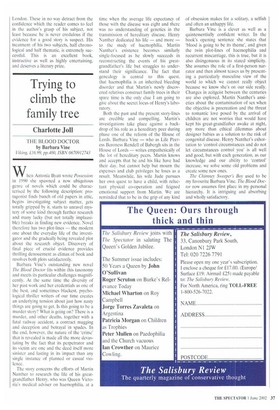Trying to climb the family tree
Charlotte Jo11
THE BLOOD DOCTOR by Barbara Vine
i16.99, pp.400, ISBN 0670912743
When Antonia Byatt wrote Possession in 1990 she spawned a now ubiquitous genre of novels which could be characterised by the following description: protagonist finds bunch of old papers in attic, begins investigating subject matter, gets totally gripped by it, starts to unravel mystery of some kind through further research and many lucky (but not totally implausible) breaks in finding new evidence. Novel therefore has two plot-lines — the modern one about the everyday life of the investigator and the gradually being revealed plot about the research object. Discovery of final piece of crucial evidence provides thrilling denouement as climax of book and resolves both plots satisfactorily.
Barbara Vine's outstanding new novel The Blood Doctor fits within this taxonomy and meets its particular challenges magnificently. At the same time the diversity of her past work and her credentials as one of the best, and sometimes blackest, psychological thriller writers of our time creates an underlying tension about just how nasty things are going to get. Is this going to be a murder story? What is going on? There is a murder, and other deaths, together with a fatal railway accident, a contract mugging and deception and betrayal in spades. In the end, however, the nature of the 'crime' that is revealed is made all the more devastating by the fact that its perpetrator and its victim are one and the deed itself more sinister and lasting in its impact than any single instance of planned or casual violence.
The story concerns the efforts of Martin Nanther to research the life of his greatgrandfather Henry, who was Queen Victoria's medical adviser on haemophilia, at a
time when the average life expectancy of those with the disease was eight and there was no understanding of genetics in the transmission of hereditary disease. Henry Nanther dedicated his life — and more — to the study of haemophilia, Martin Nanther's existence becomes similarly single-focused as be slowly succeeds in reconstructing the events of his greatgrandfather's life but struggles to understand their significance. The fact that genealogy is central to this quest, that haemophilia is an inherited bleeding disorder and that Martin's newly discovered relatives construct family trees in their spare time is the only clue I am going to give about the secret locus of Henry's laboratory.
Both the past and the present story-lines are credible and compelling. Martin's investigations take place against a backdrop of his role as a hereditary peer during phase one of the reform of the House of Lords. Barbara Vine — who as Life Peeress Baroness Rendell of Babergh sits in the House of Lords — writes empathetically of the lot of hereditary peers. Martin knows and accepts that he and his like have had their day, but cannot help but mourn the expenses and club privileges he loses as a result. Meanwhile, his wife Jude pursues her own quest to have a child, with reluctant physical co-operation and feigned emotional support from Martin. We are reminded that to he in the grip of any kind of obsession makes for a solitary, a selfish and often an unhappy life.
Barbara Vine is a clever as well as a quintessentially confident writer. In the book's opening sentence she states that 'blood is going to be its theme', and given the twin plot-lines of haemophilia and recurrent miscarriage, this is true, but it is also disingenuous in its stated simplicity. She assumes the role of a first-person narrator and then almost teases us by presenting a particularly masculine view of the world to which we cannot really object because we know she's on our side really. Changes in zeitgeist between the centuries are also explored. Martin Nanther's anxieties about the contamination of sex when the objective is procreation and the threat to romantic love posed by the arrival of children are not worries that would have kept his great-grandfather awake at night, any more than ethical dilemmas about designer babies as a solution to the risk of congenital disease. Henry Nanther's exhortation to 'control circumstances and do not let circumstances control you' is all well and good, but with each generation, as our knowledge and our ability to 'control' increase, we solve some old problems and create some new ones.
The Chimney Sweeper's Boy used to be my favourite Barbara Vine. The Blood Doctor DOW assumes first place in my personal hierarchy. It is intriguing and absorbing and wholly satisfactory.






































































 Previous page
Previous page